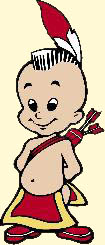 Another Stereotype of the Month entry:
Another Stereotype of the Month entry:
 Another Stereotype of the Month entry:
Another Stereotype of the Month entry:
Over the years, one "first" after another continued to add distinction to Mohawk's fame. In 1951, the famous Walt Disney Studios designed "Tommy", one of the most identifiable and effective company mascots in the history of American business. The "Tommy Mohawk" character was created for a series of animated television commercials with titles such as Tommy Tests Carpets, Tommy Plants Carpet Seeds, Tommy Falls for Minnie, Birds Use Waterfall for Loom, and others.
Rob's reply
This mascot shares the problems of all mascots. In addition, its infantile nature diminishes or trivializes real Indians. Columbus thought the people he met were "children," meaning they were incapable of having mature thoughts, beliefs, or cultures. This image perpetuates that kind of thinking.
Depicting Indians as children is another way of calling them savage or uncivilized. Once you decide they're not adults, you start making decisions for them, taking over their affairs, rewarding them when they're good and punishing them when they're bad. The whole "Great White Father" concept reflects the notion that Indians are children who need parenting.
Related links
Team names and mascots
|
. . . |

|
All material © copyright its original owners, except where noted.
Original text and pictures © copyright 2007 by Robert Schmidt.
Copyrighted material is posted under the Fair Use provision of the Copyright Act,
which allows copying for nonprofit educational uses including criticism and commentary.
Comments sent to the publisher become the property of Blue Corn Comics
and may be used in other postings without permission.